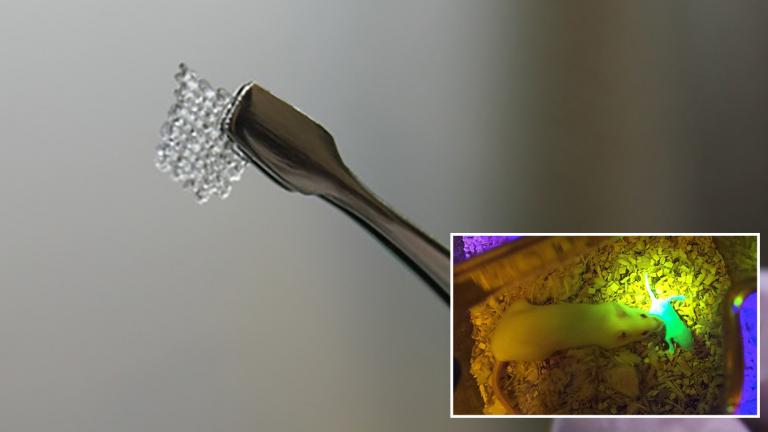
Two commonly used drugs could be potential treatments for fetal alcohol spectrum disorder, according to a new study that looked at the drugs’ ability to reverse learning and memory deficits associated with the disorder in rats.
“These two treatments can reverse it, so potentially these treatments can be explored for human fetal alcohol spectrum disorder,” said Northwestern University professor Eva Redei, the lead investigator and senior author of the study. “I would really hope, eventually, to treat fetal alcohol spectrum disorder. I hope we can prevent it but that doesn’t seem to be working.”
One in 10 American women reported drinking while pregnant, according to a Centers for Disease Control and Prevention analysis of data collected from 2011-2013. The CDC notes that as many as 2 to 5 percent of U.S. children could be affected by fetal alcohol spectrum disorder.
Symptoms of FASD, which occurs in children whose mothers drink alcohol during pregnancy, can range from mild to severe and include abnormal facial features, short stature, low IQ or intellectual disability, poor memory and learning disabilities.
“I met some children with fetal alcohol spectrum disorder and it really brings home how important it would be to have a treatment,” Redei said. “If we can’t prevent it, at least we can treat it.”
For the study, researchers gave pregnant adult rats a “moderate” dose of alcohol—the equivalent of roughly one to two glasses of wine for a human. Immediately after birth, rat pups were given either thyroxine (a natural thyroid hormone that is decreased in pregnant women who consume alcohol and infants with FASD) or metformin (an insulin-sensitizing drug that lowers blood sugar levels, which is higher in alcoholics).
The newborn pups received the drugs for 10 days, which is roughly equivalent to the third trimester in humans, according to Redei.
“Many times women drink during their first and sometimes second trimester, and then they realize they shouldn’t be doing this and they stop,” she said. “So we thought maybe we could come up with a treatment that could be used [then].”
When the rat pups matured to adulthood, researchers tested their memory and found both drugs “normalized” their learning and memory. In other words, the drugs reversed the learning and memory deficits caused by fetal alcohol exposure.
“There was no longer a difference between these [rats and] control [rats] with mothers never having alcohol to drink,” Redei said.
Drinking alcohol reduces thyroxine levels and increases glucose in pregnant rats and in humans as well, according to limited human data.
 “I met some children with fetal alcohol spectrum disorder and it really brings home how important it would be to have a treatment,” said Eva Redei, lead investigator and senior author of the study.
“I met some children with fetal alcohol spectrum disorder and it really brings home how important it would be to have a treatment,” said Eva Redei, lead investigator and senior author of the study.
“These changes are dangerous to the brain development of the fetus and are at least part of the reason for learning and memory deficits of the offspring,” Redei said.
Sufficient levels of thyroid hormones (including thyroxine) are essential for normal brain development, and alcohol use during pregnancy has been reported with significant changes in newborns, according to the study.
Children born with low levels of thyroxine were found to have lower IQ levels and impaired cognition, according to Redei.
Excessive glucose reaching the fetus also has a negative impact on brain development, but scientists do not yet have a deep understanding of why. It also can affect any of the developing organ systems and cause Type 2 diabetes later in life.
While Redei had expected thyroxine would have an effect on pups’ memory and learning, she was surprised that both thyroxine and metformin reversed their learning and memory deficits.
“Metformin was a complete surprise, so we started to think that perhaps, as strange as it is, there may be some common factor that is at play, and in both cases that’s why both of these treatments can normalize or reverse the memory deficit,” Redei said.
As researchers dug deeper, they discovered both drugs normalize genes that control a specific enzyme (DNA methyl transferase 1) that is critical for brain development during the epigenetic process.
Scientists measured this enzyme in the brain’s hippocampus, which is the region of the brain associated with learning and memory, and found it was decreased by alcohol yet increased by thyroxine and metformin, according to Redei.
To test how “critical” of a role this enzyme plays in fetal alcohol spectrum disorders, researchers ran a test. “Immediately after birth, we gave normal rat pups an inhibitor of that enzyme,” Redei said. “Their mothers didn’t have alcohol while pregnant. They were just normal pups and we ended up with adult rats that looked like fetal alcohol spectrum disorder exposed rats.”
When these rats were given metformin, the pups’ memory returned to normal. “Because we reversed that with metformin, the implication of that is clearly during development alcohol affects this enzyme,” Redei said.
Scientists are raising funds to do a clinical study in pregnant women.
Follow Kristen Thometz on Twitter: @kristenthometz
Related stories:
 Study: Antibiotic Use by Mothers Tied to Higher Risk of Disease in Newborns
Study: Antibiotic Use by Mothers Tied to Higher Risk of Disease in Newborns
July 12: Up to 40 percent of women take antibiotics late in their pregnancies or while nursing. A new study rethinks the common practice of prescribing such drugs when they aren’t warranted.
 Healthy Mice Born From 3-D Printed Ovaries
Healthy Mice Born From 3-D Printed Ovaries
May 16: Infertile mice with 3-D printed ovaries were able to give birth to healthy pups, according to a new study from Northwestern University.
 Teenage Binge Drinking Can Affect Future Children, Study Says
Teenage Binge Drinking Can Affect Future Children, Study Says
Dec. 1, 2016: Binge drinking as a teen could affect the brain function of your future children, according to a recent Loyola University Chicago Stritch School of Medicine study.








